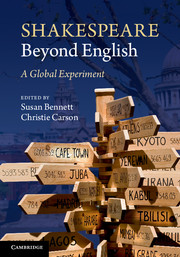Book contents
- Frontmatter
- Contents
- List of Illustrations
- List of colour plates
- Notes on contributors
- Foreword
- Acknowledgements
- Introduction
- The Globe to Globe Festival: An Introduction
- Performance Calendar
- Week One
- Week Two
- Week Three
- Chapter Seventeen Power play
- Chapter Eighteen Locating Makbet/Locating the Spectator
- Chapter Nineteen ‘Who dares receive it other’
- Chapter Twenty Two Gentlemen of Verona for/by Zimbabwean Diasporic Communities
- Chapter Twenty-One Inter-theatrical Reading
- Chapter Twenty-Two ‘This is our modern history’
- Week Four
- Week Five
- Week Six
- Afterwords
- Index
- Plate section
- References
Chapter Eighteen - Locating Makbet/Locating the Spectator
Published online by Cambridge University Press: 05 June 2014
- Frontmatter
- Contents
- List of Illustrations
- List of colour plates
- Notes on contributors
- Foreword
- Acknowledgements
- Introduction
- The Globe to Globe Festival: An Introduction
- Performance Calendar
- Week One
- Week Two
- Week Three
- Chapter Seventeen Power play
- Chapter Eighteen Locating Makbet/Locating the Spectator
- Chapter Nineteen ‘Who dares receive it other’
- Chapter Twenty Two Gentlemen of Verona for/by Zimbabwean Diasporic Communities
- Chapter Twenty-One Inter-theatrical Reading
- Chapter Twenty-Two ‘This is our modern history’
- Week Four
- Week Five
- Week Six
- Afterwords
- Index
- Plate section
- References
Summary
How does one place a production like the Teatr im. Kochanowskiego's Polish-language Makbet at the Globe Theatre in 2012? Was it, strictly speaking, Polish? Did it embody aspects of global London and the internationalized Globe or a post-Communist pan-European dystopia? Was it Shakespeare? Perhaps the question should be: how did Makbet place its audience members? Polish culture and politics, multicultural London, the Globe's theatrical traditions and Shakespeare's play all became points of orientation in Makbet, leaving individual spectators to discover where they stood in relation to the production.
Director Maja Kleczewska located the play's action in a Mafia demi-monde; the characters inhabited a clannish environment, the closeness of which led only to wretchedness. The men looked like members of a lower-order crime family in ugly athletic gear, speedos and gaudy suits. These were nasty specimens always on the edge of brutality, and their savage world was even more misogynistic than Shakespeare's (see Colour Plate 8): while Lady Macbeth (Judyta Paradzińska) chastised her sometimes insecure husband, Macbeth (Michał Majnicz) was quick to rough her up. Two of the witches, meanwhile, were transvestites who had no power over the mortal men in the play but, like the other women, were the bullied sexual playthings of the clownishly violent males. Narrow as this world was, it was also globalized in that its gruesome inhabitants swayed to the rhythms of modern popular music; the actors often danced and sang along to internationally chart-topping tunes of the twentieth century. Paul Prescott has argued that Makbet's costuming, cruelty, soundscape and its ‘disillusioned, anti-heroic and shop-soiled’ aesthetic align it with a specific form of globalized Shakespeare, ‘the sub-branch of stage Esperanto that we might affectionately call EuroShakespearean’. Yet, while Makbet may have ‘spoken’ a theatrical vernacular that mixes traditions in order to be understood across cultures, a vernacular that ‘many continental European directors’ have employed ‘for some time’, there were other forces at work that localized this production.
- Type
- Chapter
- Information
- Shakespeare beyond EnglishA Global Experiment, pp. 150 - 153Publisher: Cambridge University PressPrint publication year: 2013



